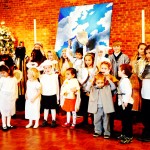As the son of my father, I love old hymns and gospel music. I’ve done my best to emulate is ability to sing every hymn in worship without having to open a book. One of the results of growing up with those songs in my head and heart is I learned to both love and sing harmony. A good hymn should always have harmony parts. Still, along with all the infectious melodies and inviting harmonies of those old gospel goodies comes a lot of bad theology, namely that heaven is the true reality and this life is nothing but a way station. My favorite example is:
this world is not my home I’m just a-passin’ through
my treasure’s all laid up somewhere beyond the blue
the angels beckon me from heaven’s open door
and I can’t feel at home in this world anymore
o Lord, you know I have no friend like you
if heaven’s not my home then Lord what will I do
the angels beckon me from heaven’s open door
and I can’t feel at home in this world anymore
On my way to my favorite coffee shop this afternoon, I heard a story on Here and Now about the Sunday Assembly, a new non-faith movement that defines itself as “a global network of super people who want to make the most of this one life we know we have.” It was started by two standup comedians in Britain who wanted the sense of community “without the God bit.” Their point is not to be atheist, but rather to invite anyone they can to join in. Sanderson Jones said, “We come from nothing and we go to nothing, so we need to make the best of the seventy, eighty, or ninety years of this life we know we have.”
What struck me in listening to the interview was their investment in this life, in these days, in being HERE and not always gazing at the horizon. They don’t see themselves as passing through. This is not a practice life or a transit lounge. This is It. For me, however, what they are describing is not antithetical to my faith because these days on this planet are the ones that matter — because of the baby in Bethlehem.
We’re not playing minor league ball here. If all that mattered was to endure these days so we could get to the Show, why would the Incarnation even be part of the story? Instead, Jesus came to show us what it means to be fully human. When he spoke, he called us to dig deep into our earthly existence and take care of one another as if we were all we had. The Sermon on the Mount is all about here; there’s no passing through. Whatever eternity looks like, we are called to live these days as if there were all there is.
Jones and Pippa Evans, the two co-founders, were not antagonistic to faith. In fact, the leader of one of the Assemblies in Britain is a Christian. They are not simply reacting to something. They have a strong sense of mission:
“We often say that we’re not going to tell you how to live, but we’re going to help you do whatever you want to do as well as you can. We still have a very strong sense of purpose and mission. You know the ‘live better, help often, wonder more,’ corresponds nicely to self-service and spirit. We’ve got an awesome mission, which is to try and help everyone live this one life as fully as possible, and a vision, which is to try to help every town, city or village that wants to have a Sunday Assembly to have one.”
I listened to them talk and I wanted to invite them to dinner. What they described about their gatherings is close to what I feel about why I am a Christian and why I am a part of a congregation, but my community is fueled by and centered in my faith. My life and help and wonder are fed by Jesus. Even as I wait for Christ to be born again this year, in the middle of the gladness and grief that surrounds me, I find myself called to remember there is more than one way to the manger. Sanderson and Pippa were not angry or adversarial, they were not picking a fight. They are doing what they can to foster connectedness and lead people to a meaningful life. I don’t look at God and faith the same way they do and I feel my faith calling me to lean into the resonance I find in their assemblies rather than trying to make sure they know I’m right.
Jesus didn’t call us to be right. He called us to live together, to pay attention, and to love as though these days were all that mattered. He would have sung along with Guy Clark:
you’ve got to sing like you don’t need the money
love like you’ll never get hurt
you’ve got to dance like there’s nobody watching
it’s got to come from the heart if you want it to work
Grant us wisdom, grant us courage for the living of these days.
Peace
Milton

